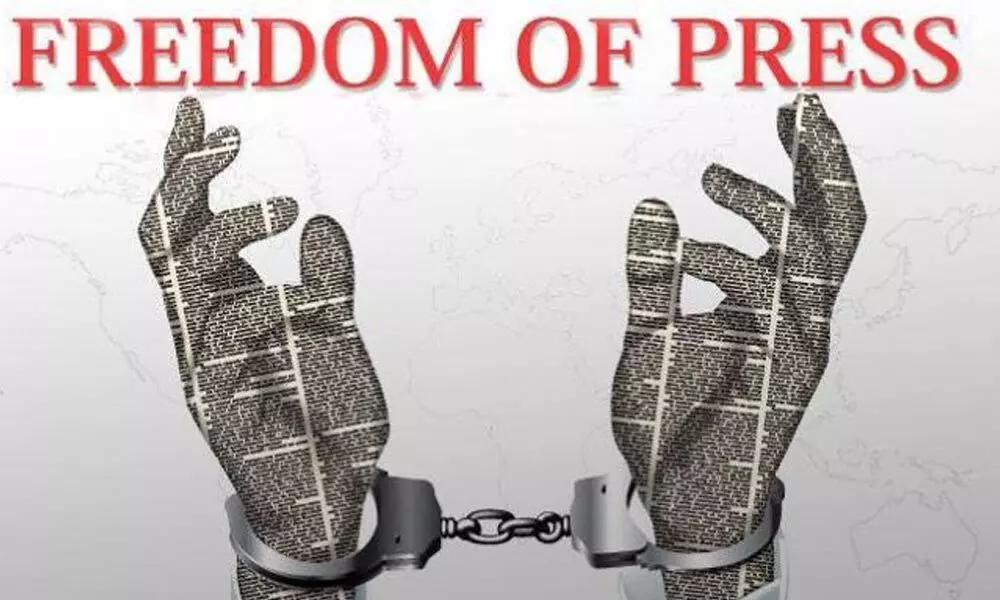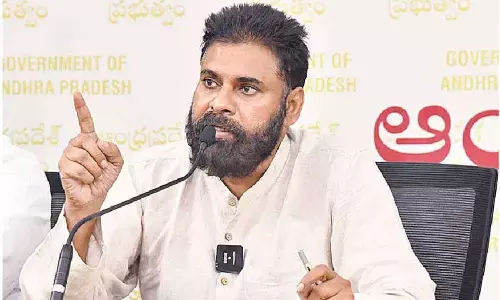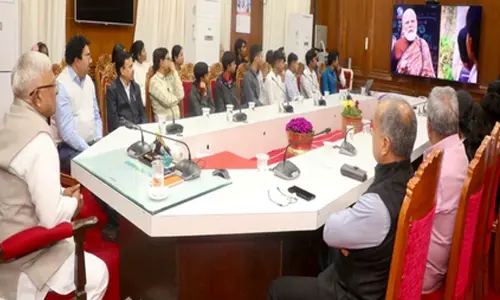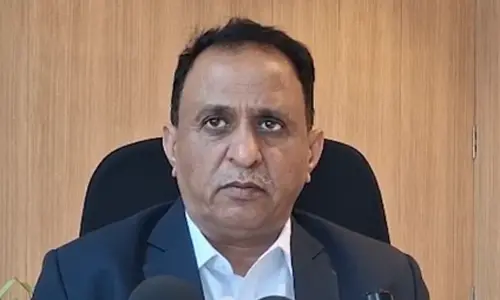Nobel Prize – A great morale booster for journalists

Nobel Prize – A great morale booster for journalists
If the purpose of bestowing awards is to recognise the fabulous work of the recipients while inspiring their tribe to follow suit, this year’s Nobel Peace Prize served it beyond an iota of doubt
If the purpose of bestowing awards is to recognise the fabulous work of the recipients while inspiring their tribe to follow suit, this year's Nobel Peace Prize served it beyond an iota of doubt. Two independent journalists, Maria Ressa of Philippines and Dimitry Muratov of Russia, won the most coveted Peace Prize at a time when the mass media's freedom of expression is under siege from the quirky quartet – draconian governments, corrupt politicians, selfish corporates and cross-commercial media managements – and the most sacrosanct element for journalists, truth, is crushed or controlled for the benefit of vested interests.
The Norwegian Nobel Committee's sensational decision is a good omen for independent journalists and alternative media outlets across the globe. The Peace prize awarded to the duo "for their efforts to safeguard freedom of expression, which is a condition for democracy and lasting peace" has come as a great relief for journalists all over the world. Journalists, being truth-seekers, fighters against despotic forces, torchbearers of freedom of expression, voice to the voiceless and protectors of human rights in the face highly life-threatening adverse conditions, can now see a reason for taking forward their noble mission. It is indeed an indictment to the alethophobic (a crippling fear of truth) authoritarian establishments and an endorsement to the extraordinary work being carried out by independent journalists.
Journalism under fire
The mainstream global journalism is literally on the deathbed due to multiple reasons. The UN Educational, Scientific and Cultural Organization (UNESCO) is absolutely right when it said pointblank that "across the world, journalism is under fire." Unhappy with the journalistic mission, truth seeking, the self-centric government heads, power-mongering political leaders, and profit-oriented corporate captains joined hands to destroy journalism in more than one way. The troika is in a hurry to get rid of the wonderful institute that strive to tell the stories that need to be told and spread the information that needs to be spread for the common good.
Barring a few, almost all media houses are into many other business (cross commercialism) and pliable media owners, lured by cash or silenced by cases, joined the bandwagon to ensure a peaceful funeral to the noble profession.
Increasing cost of production, bouts of recession and subsequent financial hardships came in handy for governments – politicians – corporates to bring the owners of the media houses to their knees. The last decade witnessed media houses in India dancing to the tunes of the governments that stormed to power with a brute majority. In a bid to control 'public opinion' for their favour, powers-that-be are aggressively buying media houses and senior journalists. Besides, the proliferation of social media, a dramatic change in news consumption habits affected the industry's health.
The final nail in the mainstream media's coffin is Covid-19 pandemic. It has completely changed the face of journalism and exposed journalists to high risk. No journalist, hence, is encouraging his friends or family members to take up the profession. Here are the established reasons behind this aversion.
The World Press Freedom Index 2021, published by the international journalism not-for profit body, Reporters Without Borders (RSF), classified India as a country that is "bad" for journalism and is termed as "one of the most dangerous countries for journalists" trying to do their jobs properly. India, same as the last year, is ranked 142 among 180 countries after it came down from 133 in 2016. Except China (177), Bangladesh (152) and Pakistan (145), our South Asian neighbours, Nepal (106), Sri Lanka (127) and even Myanmar (140 before the coup) were doing better than us.
In India, as many as 154 journalists were arrested, detained or interrogated between 2010 and 2020, and 40% of these cases were reported in 2020 alone, according to a study ('Behind Bars: Arrest and Detention of Journalists in India 2010-20) carried out by an independent journalist Geeta Seshu for the Free Speech Collective. The section 124 A of the Indian Penal Code (sedition) was intended only to punish subversion of a lawfully established government through violent means, but the governments used it as a plaster to seal the mouths of journalists. Thankfully, the Supreme Court, in a recent judgement, made it clear that journalists are entitled to protection in sedition cases.
A study combining in-depth research into the insights of industry leaders, advocates and media experts with the first-hand experiences of reporters on-the-ground in 'Global South and Emerging Economies' including India, released by the Thomas Reuters, found 'increased threat to media freedom' and 'an acceleration of journalism's financial freefall' are two of many crucial issues faced by the profession outside North America and Western Europe. Covid-19 led to closure of newspapers, downsize of journalists, and change to the structure of newsrooms and methods of reporting. The overburdened journalists' mental health and wellbeing are at risk even as misinformation, fake news and infodemic posed a great professional challenge to the journalistic fraternity.
A majority of the mainstream print and television channels lost credibility forcing readers and viewers to look for other platforms in search of reliable information, which in fact is a mirage.
In such a gloomy scenario, a good number of mainstream journalists and retired scribes took to social media platforms to practise free and brave journalism. I know a former editor and journalism educator, who has become a household name in Telugu States because of his sensible commentary on contemporary socio-political-economic issues on a regular basis. Thanks to his gift of gab, brilliant analysis and professionalism, he became a law-maker twice. The best part is he makes a decent amount from this technology-aided journalistic endeavour.
Another case in point is the popularity of an independent journalist, Teenmar Mallanna for his outspoken commentary on the day's news. Riding on the popularity wave created through his television and YouTube channels, he contested graduates' constituency elections. Though he lost to the ruling party candidate, Mallanna made a powerful mark in politics. I can't approve his pungent language in his analysis but I am floored by his guts in exposing irregularities in the system. Truth, of course, attracts retribution. Police foisted more than 30 cases and he has been in a jail for the last 45 days in a case related to an astrologer. Mallanna and his team's success stands as a testimony for fearless, free, independent journalism.
Besides trained journalists, some media enthusiasts too turned into independent journalists to inform, entertain, speculate and investigate braving adverse conditions. This business model, sans huge investment, is quickly embraced by the younger generation. There is no denying that politicos of all hues are out there to make use of the newest media for publicity and propaganda.
Role of civil society
Thanks to the technology, we are in for more and more independent journalists and self-styled media persons. The glut of information is bound to be multifold but the moot point is who will support the sincere, independent journalists? It is unfair to ask such journalists to fight their own battle when they are striving to bring out truth for you, me and others. We should be sympathetic towards these sane voices and there is an urgent need to protect the true independent journalists for whom 'truth' and 'public' are paramount.
Civil society groups, academia, and concerned individuals should lend their helping hand to independent journalists for the sake of peace, prosperity and democracy. If you are in a position to contribute money to their cause, it is fine. More than funding, a word of appreciation for their stories works wonders. Don't take police raids on their workplaces or arrests lightly. Their protection and survival are in the hands of all educated Indians.
I wish to sign off with a pertinent question purportedly asked by the WikiLeaks founder Julian Assange, who ruined his life in digging up secret information for public consumption: "What are the differences between Mark Zuckerberg and me? I give private information on corporations to you for free, and I am villain. Zuckerberg gives your private information to corporations for money and he's Man of the Year." I see helpless cry and fervent appeal in the jailed Australian's words. Let us value the "villains" like Assange, Ressa, Muratov and Mallanna around us and respond to their cries without fail.
(The author, a PhD in Communication and Journalism, is a senior journalist, journalism educator and communication consultant)
(The opinions expressed in this column are that of the writer. The facts and opinions expressed here do not reflect the views of The Hans India)














